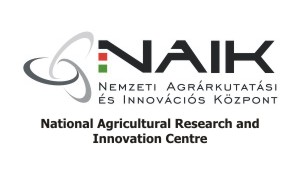Agro-Environmental Research Institute

About the institute
The Agro-Environmental Research Institute (AERI) operates as a part of the National Agricultural Research and Innovation Centre (NARIC), a network of institutes located throughout Hungary. Main activities of the Agro-Environmental Research Institute include basic and applied research in the areas of chemical, microbiological and genetic safety of agricultural technologies, as well as lecturing in university graduate and post-graduate education in the area of Applied Environmental Studies/Environmental Science. Scientific research by the institute include environmental monitoring of organic microcontaminants and of transgene behaviour in agriculture and nature. This involves environmental and applied microbiological studies, as well as ecotoxicological studies of agricultural phenomena.
The foremost predecessor of our institute is one of the first ministerial agricultural research institute in Hungary: the National Phylloxera Research Station, founded in 1880 (later called the Royal Hungarian State Entomological Station). Further research institutes have also been established on the same campus. Among these, the Royal Hungarian Institute of Agricultural Botany and Ampelology was established in 1917. The immediate legal predecessor of our institute was the Canning Meat and Refrigeration Institute (KOHIKI), established in 1949, which have later given birth to new research institutes at new sites, due to the expansion of its scientific profile, and was re-established as the Central Food Research Institute (acronyms: KÉKI in Hungarian, and CFRI in English) in 1959. The profile of the institute significantly broadened in 2011, and reflecting the „from field to table” concept of the EU, food science research was expanded to cover environmental safety aspects as well, which manifested in the new name, Central Environmental and Food Science Research Institute, legally established in 2012. The environmental analysis and ecotoxicology research branch of the institute roots in the Plant Protection Institute of the Hungarian Academy of Sciences, where it was originally formed in 2003. In 2011, the environmental analysis and ecotoxicology facilities were joined by a microbiology laboratory. The institute became an integral part of its legal successor, the National Agricultural Research and Innovation Centre in 2014, where it continues to operate as the Agro-Environmental Research Institute (AERI) and as the Food Science Research Institute (FSRI).
The main research topics of the Agro-Environmental Research Institute are
- Identification and analysis of agricultural and environmental safety risks.
- Determination of organic micropollutants (pesticide residues, mycotoxins) of agricultural origin and determination of transgenic components in environmental (surface water, ground water, soil) and biological samples.
- Development of analytical methodology and instruments/utilities for the determination of environmental and water pollutants.
- Development of modular analytical instruments based on fluorimetry and laser-plasma spectroscopy in in situ complex water quality assurance measurements.
- Research on compost as a “virtual organism”, using methodologies in genomics, proteomics and microbiology.
- Mapping of unique microbiota of special environments and food/feed samples.
- Ecotoxicological investigations pertaining to chemical plant protection and agricultural applications of transgenic technologies.
- Research on chemical and biological main and side-effects of organic micropollutants of agricultural origin.
- Genetically modified (GM) plants.
- Environmental analytical and ecotoxicological investigations of the effects of genetically modified (GM) plants and characterisation of GM plants as feed ingredients.
- The effects of GM corn on aquatic organisms in natural waters.
- Analysis of the international authorisation and licensing system of pesticides and genetically modified (GM) plants.
- Research for the improvement of ecological agriculture and agricultural ecology.
The research units at AERI NARIC
- Department of Environmental Analysis (Head: Mária Mörtl, PhD).
- Department of Environmental and Applied Microbiology (Head: József Kukolya, PhD, CSc).
- Department of Ecotoxicology (Head: Eszter Takács, PhD).
Current international research projects at AERI NARIC
- EU FP7 SPICED (2013-2016)
- NATO SPS Biotox (2015-2018)
The involvement of AERI NARIC in international organisations
- International Biosafety Clearing-House Organisation (Convention on Biological Diversity)
- COST Agriculture, Biotechnology and Food Sciences Technical Committee
- European Food Safety Authority (EFSA)
- European Network of Scientists for Social and Environmental Responsibility (ENSSER)
- Organisation for Economic Cooperation and Development (OECD)
Other activities of NARIC AERI
- Involvement in university graduate and post-graduate training and education (Szent István University, Eötvös Loránd University, Budapest University of Technology and Economics).
- AERI NARIC hosts the Extension Department of Ecotoxicology, Szent István University (Head of Department: Prof. András Székács).
- AERI NARIC contributes to the work of state authorities and state advisory bodies, e.g. the Gene Technology Assessment Committee, the Plant Protection Committee of the Ministry of Agriculture, the Presidential Committee of the Hungarian Academy of Sciences for the Protection of Environment, the GMO-Roundtable.
- AERI NARIC is involved through its key scientists in the Editorial boards/Review boards/Senior Editors/Reviewing Editors of Hungarian and international scientific periodicals (BioRisk, Insects, Biokontroll, Biokémia).
- AERI NARIC hosts the Society of Hungarian Ecotoxicologists.

